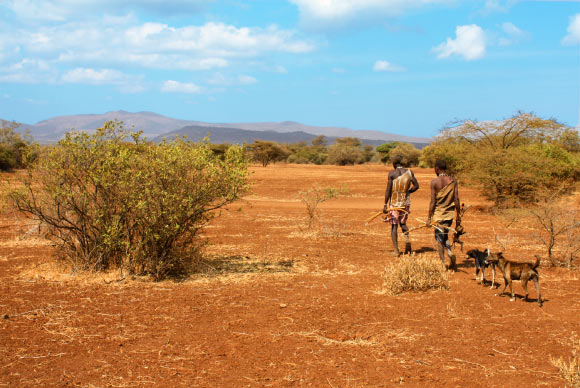According to new research published online today in the journal Science, sex equality in residential decision-making explains the unique social structure of modern hunter-gatherer societies.

Two Hadza men return from a hunt. The Hadza people are one of the last hunter-gatherer tribes left in Africa. Image credit: Andreas Lederer / CC BY 2.0.
The results answer a longstanding mystery about why hunter-gatherer populations have evolved to comprise large numbers of unrelated individuals, especially since hunter-gatherers have shown a strong preference to live with kin.
Previously, studies have pointed to pair-bonding, or lifelong monogamous relationships in which couples go off and leave family behind, as one possible driver of hunter-gatherer groups made up of few related individuals.
The authors, Mark Dyble of University College London and his colleguaes, lived among populations of hunter-gatherers in Congo (Mbendjele BaYaka people) and the Philippines (Agta people) in 2013 and 2014.
They collected genealogical data on kinship relations, between-camp mobility and residence patterns by interviewing hundreds of people. This information allowed the team to understand how individuals in each community they visited were related to each other.
Despite living in small communities, these hunter-gatherers were found to be living with a large number of individuals with whom they had no kinship ties.
The scientists then developed a model of hunter-gatherers’ behavior – running two versions of it, one where both the husband and wife in a hunter-gatherer couple could have equal influence over where their household would reside, and another where only one sex had influence.
They found that when both men and women had say over their living situation, with both husband and wife striving to maximize numbers of kin in their camp, communities were much less closely related than when only men or only women could choose.
Data from Agta and Mbendjele BaYaka hunter-gatherer societies matched the model closely.
“Sexual equality seems to reduce relatedness of the people in a camp at any one time, but, critically, it increases the number of camps where an individual has one or more kin living, paving the way for cooperation and information exchange among groups without the need for more complex drivers, like wealth or war,” the scientists said.
The study represents an important contribution to our current understanding of human social and behavioral evolution.
“Sex equality suggests a scenario where unique human traits such as cooperation with unrelated individuals could have emerged in our evolutionary past,” said study senior author Dr Andrea Migliano of University College London.
_____
M. Dyble et al. 2015. Sex equality can explain the unique social structure of hunter-gatherer bands. Science, vol. 348, no. 6236, pp. 796-798; doi: 10.1126/science.aaa5139







